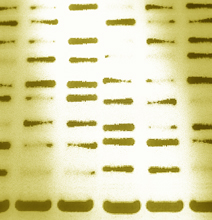Microsatellite instability
The microsatellite instability (MSI) test should be performed on the tumor of a family member who has or had colorectal cancer.
The tumor sample to be tested can be obtained from the hospital where this relative was operated

The test looks for changes in DNA regions called microsatellites, which tend to be unstable (highly prone to mutations) when the DNA repair mechanisms controlled by MLH1, MSH2 and MSH6 genes are not functioning correctly.
Although not exclusive to hereditary cancers, more than 90% of HNPCC (Lynch Syndrome) tumors are MSI+.
When an MSI+ result is associated with a significant family history of colorectal cancer, a genetic study is advised.
The association to family history is crucial because in 10-15% of cases of sporadic (not linked to hereditary mutations) colorectal cancers the tumors are also MSI +.
See here how to understand MSI results.






